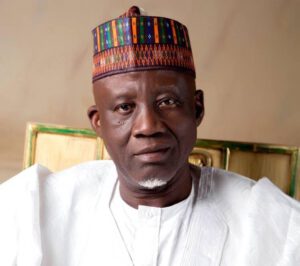Muhammad Dingyadi, Nigeria’s Minister of Police Affairs, ruffled not a few feathers on Tuesday, November 17 when he unabashedly declared that the government had degraded bandits terrorising hapless Nigerians.
Though such outlandish claims are somewhat routine, Dingyadi’s latest attempt at trivialising an otherwise worrisome situation is particularly irksome, given the growing impunity with which the criminals now operate.

“You see, these bandits have already been degraded. So, there is no way they can resuscitate themselves and take over…I think they have been well degraded and they are just trying to show their presence in a very cowardly manner,” the minister said while briefing reporters after the quarterly meeting of the National Security Council(NSC) in Abuja.
Dingyadi could as well be talking to non-Nigerians. For, in a week when kidnap activities took the central focus of news reportage, no Nigerian, or resident, needs any preachment to know that not only is violent crime, especially kidnapping, alive and prevalent; it was thriving as well.
From news of the hitherto muted abduction of 12 Assistant Superintendents of Police (ASPs) while traveling from Borno to Zamfara state, to the chilling kidnap of some Nigerian French Language students of Ahmadu Bello University, Zaria, the Police Affairs Minister’s boasts represents, at best, playing Russian roulette with the lives and well-being of Nigerians.
Add the killing, in Gidan Zaki community of Zango-Kataf Local Government Area of Kaduna state, of the District Head, Haruna Kuye and his son, Destiny and the kidnap, for ransom, of eight travellers in Edo state, same day, and one is left wondering if indeed the government has not thrown up it’s hands in pitiable surrender.
Ironically, as the reign of fear festers, security sources are said to be of the opinion that it is the citizenry that rather provide the oxygen which keeps the bandits in business through the payment of ransom.
Yesterday, Dennis Amachree, an ex-Directorate of State Security(DSS) operative counselled against the payment of ransom by family members of kidnap victims.
Speaking on an African Independent Television (AIT) breakfast show, Kakaaki, Amachree canvassed a government policy that outlaws the payment of ransom.
On face value, while the former spy’s position appear logical – to the extent that knowledge of unavailability of ransom funds would make the trade unattractive – Amachree obviously didn’t consider the moral hazard of having anyone in unlawful custody. Yet uncertain if the government will even lift a finger in an effort to set such captive free.
For a country that seeks to control even the water resource under the dwelling places of the citizenry, how come it is so difficult to take charge of the open, ungoverned spaces where these bandits operate from?
In a clime where the dichotomy between the rich and affluent, and the poor and vulnerable, are very pronounced, everyone is, perhaps, left to devise their own survival strategies. While the wealthy choose to travel more by air, and in the case of Kaduna, by train, hapless citizens are left to trudge the roads littered on both sides by dare-devil kidnappers.

But whether rich or poor, the trauma associated with kidnapping remains the same. In deed, it is mankind’s most severe form of stealing. At one go, a plethora of consequences become evident: the victim and his loved ones lose their peace of mind; suffer dehumanization; ruptures societal harmony; enthrones a culture of fear; suffer loss of cash possession; and in extreme cases, loose lives.
Denied easy access to the super rich, the bandits appear to have turned their blistering weapons of death on ordinary folks, mainly in rural communities of the North and the pothole ridden roads of the South, taking along with them fellow citizens as articles of trade.
Taken through a tortuous and circuitous route into the belly of impregnable forests, and subjected to all manners of degrading treatment, family members of victims are often left with no choice but succumb to the monetary demands of the captors.
SB Morgen, a Nigerian consulting firm, in a recent report, put the total ransom payment over a nine-year period, 2011-2020, at $18million. Using data gathered from a variety of sources, including the company’s Nigeria Security Tracker, SB Morgen stated that the figure rose steeply, with about $11million paid out between 2016 and 2020 alone.
Instructively, it was the Nigerian government that first gave legitimacy to the kidnap-for-ransom trade, by consenting to the practice.
On April 26, 2013, the British Broadcasting Corporation, BBC, quoting a confidential Nigerian government report, stated that Boko Haram got $3 million in ransom, to free a French family of seven kidnapped in February but released in the third week of April, 2013.
Also, in 2018, despite strident denials by Nigeria’s Information and Culture Minister, Lai Mohammed, a United Nations report insisted that the authorities paid a “large ransom” to free tens of female students taken hostage by Boko Haram from their school in Dapchi, Yobe state.
Titled “22nd Report of the Analytical Support and Sanctions Monitoring Team” concerning Resolution 2368(2017), the report stated inter alia:”In Nigeria, 111 schoolgirls from the town of Dapchi were kidnapped on 18 February 2018 and released by ISWAP on 21 March 2018 in exchange for a large ransom payment.”
Earlier, ransom had also been paid for the release of many Chibok schoolgirls kidnapped in 2014 – a fact confirmed by many senators, including Ahmed Lawan, then Senate Leader, but now President of the Nigerian Senate.

For ordinary folks, their losses, of both life and money, is not easily quantifiable. In one instance alone, Reverend Joseph Hayab, chairman of the Kaduna state chapter of the Christian Association of Nigeria(CAN), said in August 2019 that the church had lost about N300 million in ransom payment for 500 kidnapped Christians.
Hayab:”We are still computing, but at the last count, we realised that the church has coughed out over N300 million as ransom to kidnappers. In one village, the church has given kidnappers over N20 million. In the case of the chief of Kajuru that was killed, it was N8 million the kidnappers took. There was the Reverend Father in Kachia, they took about N1.5 million. They still killed him.”
Quite unlike Philip Walton, the American seized from his farm in Niger Republic and brought to a border community in Nigeria, most Nigerians live through the times, not sure of what fate lies ahead.
While Walton was rescued by an elite SEAL squad of the Americans, Nigerians remain unsure of what is to come, in the event of a kidnap.
Who can really blame them?
Confronted with the chilling poser, ‘ your money, or your life?’, it is doubtful if anyone would elect to die, because of an obstinate insistence of not wanting to pay ransom.
The solution, as it were, lies on the shoulders of the government: flush out the bandits, and not just degrade them.
I wonder how leaders parade and pride themselves without conscience. Security of lives and properties is a statutory obligation of any Government to her people. I wonder again why Mr President keep housing kid gloves experts as aides. Our number one citizen need to do more so as to salvage this ugly tide.
Yes, your life or your money, Well captioned.This is the narrative . This is the story of Nigeria, where lives have lost value. I hope the authorities will see through the magnitude of this challenge and seek for help, even if it were from outside. Imagine Americans coming into Nigeria to rescue their own. We can as well ask for their help ,at least to secure the lives of citizens,while they go about seeking for daily bread.